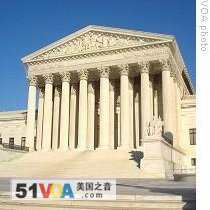Washington
24 March 2009
 |
| US Supreme Court, Washington DC |
During last year's presidential election campaign, a conservative group called Citizens United produced a 90-minute film about then Senator Clinton's campaign for the White House.
The film is entitled Hillary: The Movie.
It portrays then candidate Clinton in a negative light and includes interviews with many critics of the former First Lady and her husband, former President Bill Clinton.
Among those appearing in the film is former Bill Clinton political adviser Dick Morris, who has become a fierce critic of both Clintons in recent years.
The man behind the film is the head of Citizens United, David Bossie - a former congressional aide and a longtime critic of the Clinton's.
Bossie is a regular guest on cable news channels as a conservative activist.
"And that is why I am able to just step back and be able to say the things that need to be said. The truth sometimes hurts," he said.
The film played briefly in a few theaters and was available on DVD. But the producers ran into trouble when they wanted to run ads about the film and tried to place it on cable television systems around the country, so that home viewers could watch it.
A federal court ruled that the movie was the equivalent of a political attack advertisement and, as such, was subject to regulation by federal campaign finance laws.
Those laws prohibit political attack ads targeting specific candidates from airing on television and radio in the final weeks of a political campaign.
The producers of the Hillary Clinton movie decided to fight the lower court ruling and brought the case before the Supreme Court of the United States. Their lawyer, former Bush administration official Ted Olson, argued that the film was an attempt to inform and educate voters about Senator Clinton, and did not explicitly urge people to vote against her or for her opponent.
During oral arguments on Tuesday, some of the liberal Supreme Court justices seemed to view that claim skeptically.
But some of the more conservative members of the high court expressed concern that if a movie can be subject to government regulations like a political ad, why not books as well?
How the court rules could have a significant impact on existing campaign finance laws. A decision is expected sometime before the end of June.